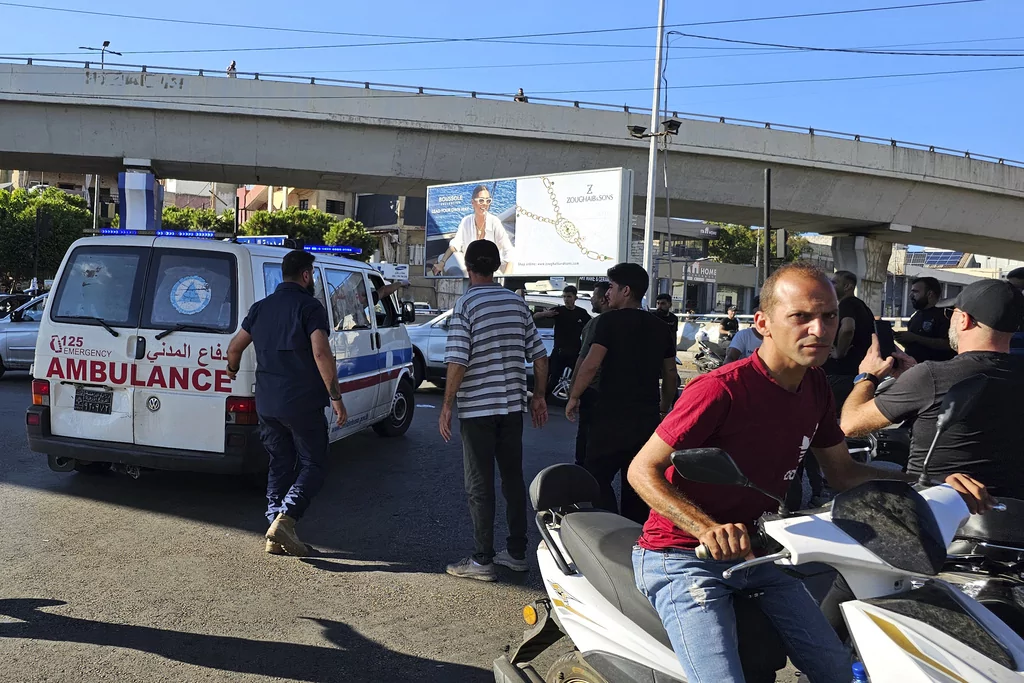
Scores of Hezbollah operatives were injured in Lebanon on Tuesday in a seemingly coordinated attack in which hundreds of their electronic pagers exploded simultaneously.
The number of Hezbollah members whose pagers exploded and the perpetrators of the attack are unknown in the immediate aftermath of the incidents, which began Tuesday morning local time. Lebanon’s health minister, Firas Abiad, said at least eight people were killed and 2,750 wounded, according to the Associated Press. Hezbollah told Reuters that at least three people, including two of its fighters and a girl, were killed. The Israel Defense Forces declined to comment.
Social media was flooded with security footage from shops in Lebanon allegedly showing the moment the pagers malfunctioned. It is also unclear how exactly the pagers were rigged to explode, although the Wall Street Journal reported that the affected pagers were from a new shipment received by the group in recent days.
Lebanon’s health ministry urged citizens with pagers to discard them and warned hospitals to be on “high alert” for more victims. The Lebanese Red Cross said more than 30 ambulances were involved in rescue efforts, while 50 other ambulances were put on high alert to support those operations. The organization said it was responding to “multiple bombings across South Lebanon, Bekaa Valley and the Southern Suburbs of Beirut.”
Iranian Ambassador to Lebanon Mojtaba Amani was injured, but not seriously, in an explosion, according to state media.
BREAKING via Reuters
Hundreds of members of Hezbollah were seriously wounded on Tuesday when the pagers they use to communicate exploded.
Here is one video of one of the pager explosions. pic.twitter.com/UDepHvkkEe
— Yashar Ali
(@yashar) September 17, 2024
Israel’s security agency, known as Shin Bet, said on Tuesday that it foiled a Hezbollah assassination plot targeting a former senior defense official but did not identify the former official.

The electronic warfare attack is believed to be the latest in the conflict between Israel and Hezbollah. The two sides have long been adversaries, though the flare-up in tension began in the aftermath of Hamas’s Oct. 7 terrorist attack. In the days that followed, Hezbollah began firing rockets and missiles from southern Lebanon into northern Israel, which prompted Israel to evacuate more than 50,000 residents from northern Israel who are still not back in their homes due to the threat.
Israel’s and Hezbollah’s attacks against one another have largely been constrained, with both sides cautiously avoiding escalating the situation to an all-out war. Experts believe that a full-fledged war between the two would be very costly for both sides, including through the destruction that would ensue, as well as a significant death toll.
CLICK HERE TO READ MORE FROM THE WASHINGTON EXAMINER
The United States, among other countries, has desperately sought to prevent the escalation of the Israel-Hezbollah conflict since its reinvigoration last October.
“Amos’s travels are very much a continuation of the diplomacy that he’s been conducting now for many months to try to prevent a second front from opening up in the north there, all part and parcel of this administration and this team’s efforts to prevent an escalation and a widening of this conflict,” National Security Council spokesman John Kirby said last week.






